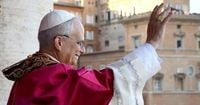The election of Pope Leo XIV, the first pontiff from the United States, has sparked widespread reactions on social media, particularly concerning his past statements and positions on immigration. Leo XIV, born Robert Francis Prevost in Chicago, has made headlines for his vocal criticisms of anti-immigrant rhetoric, notably targeting figures like J.D. Vance and Donald Trump. His stance raises questions about whether he will continue the pro-migrant legacy of his predecessors, especially Pope Francis, who passionately advocated for the rights of migrants and refugees.
Before ascending to the papacy, Prevost was active on social media, particularly on X (formerly Twitter), where he amassed a following of nearly 400,000. His account, @drprevost, distinct from the official papal account @Pontifex, has seen over 400 posts since its creation in August 2011. Prevost has utilized this platform to address various global issues, including racism, the COVID-19 pandemic, and the ongoing conflict in Ukraine.
In 2015, while still a bishop, Prevost publicly criticized Trump’s anti-immigration policies, describing them as a "dark moment in the history of the United States". This sentiment echoes the broader Catholic teaching on immigration, which has been shaped by a long-standing tradition of welcoming the stranger. Pope Pius XII, for instance, emphasized the natural right to migrate, arguing that governments should facilitate the movement of people seeking better living conditions.
Leo XIV’s election has prompted many to question whether he will uphold this tradition. His predecessors have consistently advocated for the rights of immigrants, framing it as a moral imperative rooted in Christian doctrine. Pope John XXIII extended the argument for immigration rights in his encyclicals, while Pope Paul VI insisted on a Christian duty to serve migrant workers without discrimination.
Following the death of George Floyd in 2020, Prevost called for clergy to speak out against racism, urging them to reject discrimination and seek justice. His comments reflect a commitment to social justice that aligns with the Church’s teachings on dignity and respect for all individuals, regardless of their background.
In his first homily as Pope, Leo XIV suggested that the Christian faith may seem "absurd" to some, yet he reaffirmed the Church's mission to promote universal mercy and acceptance. This perspective is particularly relevant as he navigates the complexities of immigration policy in the current political climate.
The Vatican has historically supported a universalist approach to immigration, rejecting discrimination based on nationality or ethnicity. Pope Francis, who served from 2013 to 2025, encapsulated this ethos in his encyclical, Fratelli tutti, which called for recognizing every human being as a brother or sister and fostering an inclusive social friendship.
As Leo XIV takes on his role, many are watching closely to see if he will maintain this welcoming stance. His background as the grandson of immigrants from France, Italy, and Spain may influence his approach to immigration issues. The Pope’s life experiences, having lived over two decades in Peru, also shape his understanding of the challenges faced by migrants.
Reactions to Leo XIV's election have varied widely. French President Emmanuel Macron hailed it as a historic moment for the Catholic Church, while far-right politicians like Marine Le Pen expressed hope that he would pursue peace, akin to John Paul II. Conversely, some critics in the U.S. have labeled him as "anti-MAGA" and "woke" due to his outspoken views on immigration and social justice.
In February 2025, Leo XIV shared an article titled, "J.D. Vance is wrong: Jesus does not ask us to prioritize our love for others," directly countering Vance’s assertion that Christians should first love their families before extending compassion to others. This response highlights the Pope's commitment to a more inclusive understanding of Christian love and duty.
Leo XIV’s social media presence has allowed him to engage with contemporary issues in real time, making him the first Pope to lead the Holy See with such a robust online footprint. His posts often reflect a blend of traditional Catholic values with modern social concerns, addressing topics such as the death penalty, which he declared "not admissible" in 2022, and the urgent need for transparency regarding sexual abuse within the Church.
As he embarks on his papacy, the question remains: will Leo XIV continue to advocate for the marginalized and uphold the Church's long-standing commitment to immigration rights? His past actions suggest a willingness to challenge the status quo, but the complexities of global politics and the diverse opinions within the Church may shape his approach.
The legacy of the papacy is often defined by its response to pressing social issues, and Leo XIV seems poised to carry forward a message of inclusion and compassion. The world watches as he navigates these challenges, hoping for a papacy that reflects the core values of Christianity—love, acceptance, and the fundamental dignity of every human being.




